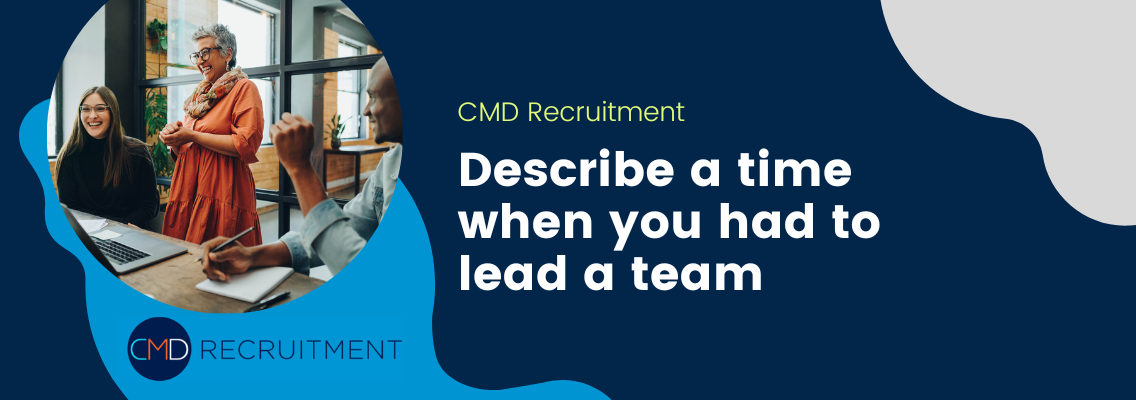Important notice - We are aware of a scam where people are impersonating CMD Recruitment to offer jobs via WhatsApp & Telegram. This is a scam, CMD Recruitment will never contact new candidates via these methods. Any legitmate offer from CMD Recruitment would be made via a telephone call.

January 16, 2023
While you may have many years of leadership experience under your belt, nailing the interview is still crucial to landing the job. You might be a highly effective leader, but if you can’t demonstrate why this is the case in an interview setting, you could miss out on a role.
Here are six common leadership questions that you should be prepared to answer in order to impress the interviewer and demonstrate your qualifications.

“To me, leadership is about being open, honest, and selfless. It is about looking beyond yourself and understanding the needs of your team members. True leadership also involves taking the initiative to set an example for others to follow and working hard to bring out the best in everyone around you.
Leaders must be able to trust their own judgement while also listening intently to those they are leading – whilst having a clear vision and direction of where they want the group to go. Ultimately, leadership boils down to recognising that the success of your team relies not only on one person; rather, it requires a collective effort from every individual.”

“Working in my first leadership role felt like a daunting challenge, but I quickly realised that the process was something I was capable of doing.
I had to come up with strategies and tasks for a team of volunteers working on a project to raise awareness about a social issue in our local community. It tasked me with understanding different people’s strengths and weaknesses, as well as grasping how they interacted and worked together as a group.
Most importantly though, I learned how to be both firm and kind in delegating tasks while keeping the underlying purpose of the project in mind.
Through this experience, I gained valuable insight into how to support individuals to come together and bring out their best collective efforts.”

“When it comes to leadership, one of my greatest strengths is my ability to encourage collaboration. I’m able to bring out the best in everyone by helping them work together and trust each other. This allows us to make decisions faster and become more efficient as a team.
On the flip side, one of my weaknesses is delegating tasks effectively. I tend to micromanage which slows our progress down and restricts the ability of others to work independently on the project.
In order to address this, I’ve been working on communication skills and trusting others more with their workloads. By doing this, I’m getting better at trusting members of my team and allowing them space to take initiative and contribute to our successful projects.”

“One of the biggest challenges in my career was when I was put in charge of a major reorganisation at my company – and I was fairly new to my leadership role, which made it more difficult. We had grown significantly and needed to restructure our departments for more efficient operations.
After much deliberation, I had to choose between two solutions that both had significant pros and cons. It was an especially complicated decision because it would have an impact on many employees’ roles.
In the end, I chose the solution that would be most beneficial to the organisation’s long-term goals while minimising disruption.
It took me days of difficult conversation and consideration, but in the end, it worked out great. Not only did we streamline operations and better support our growth objectives, but morale levels remained stable as well.”

“Conflict within a team can be tricky to navigate but diffusing it quickly and properly is key. The best approach is to address the conflict openly in a safe space for all parties involved, where each individual can express their thoughts and feelings without fear of judgement.
This allows team members to listen to each other’s perspectives and find common ground. In the spirit of cooperation, I would always consider offering solutions together rather than adversarially. In other words, brainstorm ideas that bring together different positions or arrive at a compromise by working off of each person’s initial suggestion.
Peacemaking dialogue helps teams work through current disagreements as well as build trust for future collaboration.”

“Being an effective leader involves several different skills that must be cultivated and perfected. As a leader, being able to effectively communicate your vision and motivation for getting tasks completed for the greater good plays a large part in success.
I believe that I have great listening skills and a capacity to understand and empathise with others, which are both essential as this helps to foster trust in you as a leader.
Being decisive, organised, dedicated and reliable are further qualities of an effective leader; nothing motivates people more than having someone dependable at the helm. Lastly, maintaining a sense of humility will create loyal followers who will respect and admire your leadership abilities.”
Back to Blog